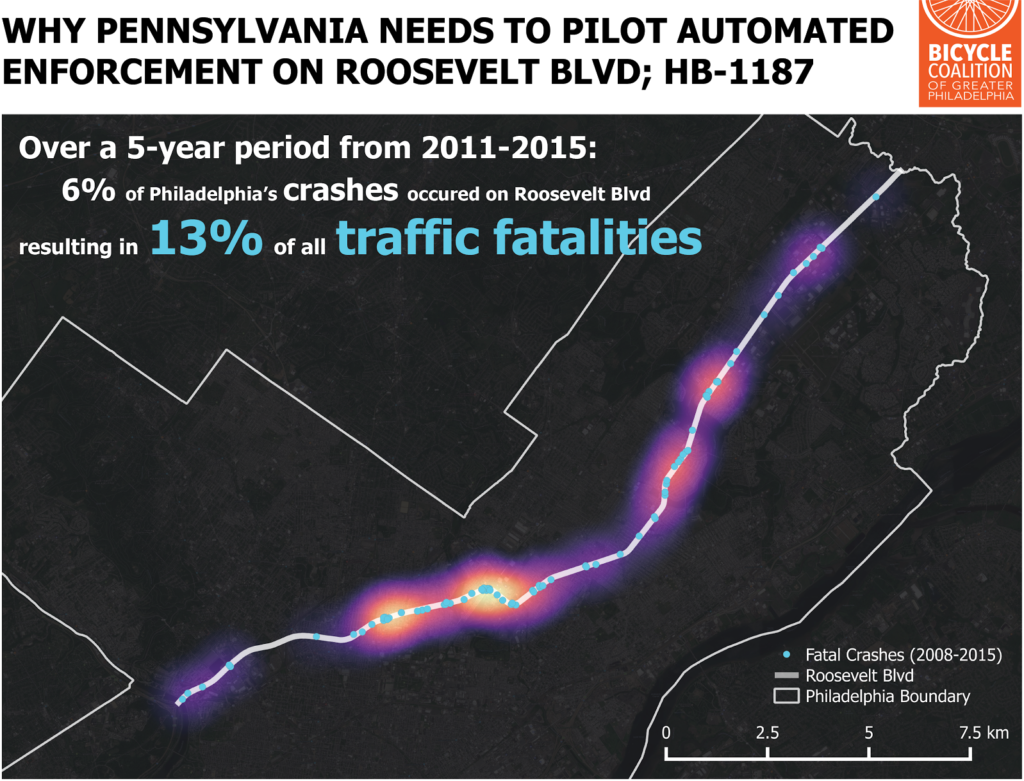
On Monday and Tuesday, Bicycle Coalition policy coordinator and members of the Vision Zero Alliance traveled to the state Capitol to advocate for a bill that would put a speed camera Pilot project on Roosevelt Boulevard. The Bill, HB 1187, was recently introduced by state Rep. John Taylor (R-Phila) after working and meeting with the Bicycle Coalition over the past two years.
Once in Harrisburg on Monday and Tuesday, the Bicycle Coalition, along with allies from the Vision Zero Alliance visited both House Republican leadership and Democratic representatives to advocate for HB 1187.
Rep. Taylor’s bill would pilot speed cameras on Roosevelt boulevard for five years — after which the usefulness of the cameras would be assessed. Speed cameras have been proven useful and have provided safety to road users where they’ve been tried, which is why the Bicycle Coalition supports them for Roosevelt Boulevard. (Read more about our advocacy for smart, automated enforcement here.)
Long term, the Boulevard needs to be redesigned and engineered. But until then, it’s worth adding this safety feature to cut down on fatal crashes.
This one roadway makes up only 0.6 percent of all Philadelphia’s 2,500 miles of streets. Yet over a 5-year period, 2011-2015, 13 percent of all traffic fatalities occurred on Roosevelt Boulevard. And 36 percent of those killed on Roosevelt Boulevard were pedestrians.
Joining the Bicycle Coalition in Harrisburg on Tuesday were AAA, the Delaware Valley Smart Growth Alliance, the Greater Philadelphia Association of Realtors, and Latanya Byrd, whose niece, Samara Banks, and three of Banks’ children, were murdered by drag racers on the Boulevard in 2013.

Latanya Byrd speaks out for safety in the state Capitol
The group met with Reps. Reed, Cutler, Dermody, Oberlander, and several others, to stress the safety aspects and why those representatives should help make it law.
The staffs and representatives the group met with were all deeply moved by Ms. Byrd’s presence and the horrific story she told.

Ms. Byrd and her son in front of Rep. Taylor’s office
Most pledged to work with Rep. Taylor (the chairman of the House Transportation committee) to move this bill forward.
The more the cycling community and anyone who’s an advocate for safer roads can contact their representatives and ask them to support HB 1187, the better.
That’s why we’ve set up this email campaign.
Click here, type in your address, and you will be able to send your state representative a personal email calling for the passage of House Bill 1187.

Unlike some of my fellow motorists, I can see the possibility that speed cameras may help to improve safety on roads like The Boulevard. However, I firmly believe a broad approach to such matters would work better and be fairer to all the constituencies. The speed setting at which the cameras start to issue tickets needs to be determined by careful analysis of crash data, not by arbitrary decision, as will be done as the bill is written so far. Also, ticket recipients deserve to be informed within 72 hours of the event, with tickets being mailed within 48 hours, not a month. And, constitutional principles need to be followed in adjudication of complaints. Further, the accuracy of camera testing needs to be verified by an entity other than the one supplying the cameras. Roads like The Boulevard have many problems, and focusing merely on speed won’t solve the problem of deaths along the route. Making the road easier to drive without frustration for drivers should be one primary focus. There should be no unsignalized crosswalks on a road like The Boulevard, and improving signalization in this way and in others, like in separating the green light for cars from pedestrian crossing times, is not an unduly expensive proposition. Improving lighting might be another critical aid as many car-pedestrian collisions occur at dawn and dusk. Focusing too narrowly on speed not only won’t work, but it will fail to create the optimal balance between drivability and safety.